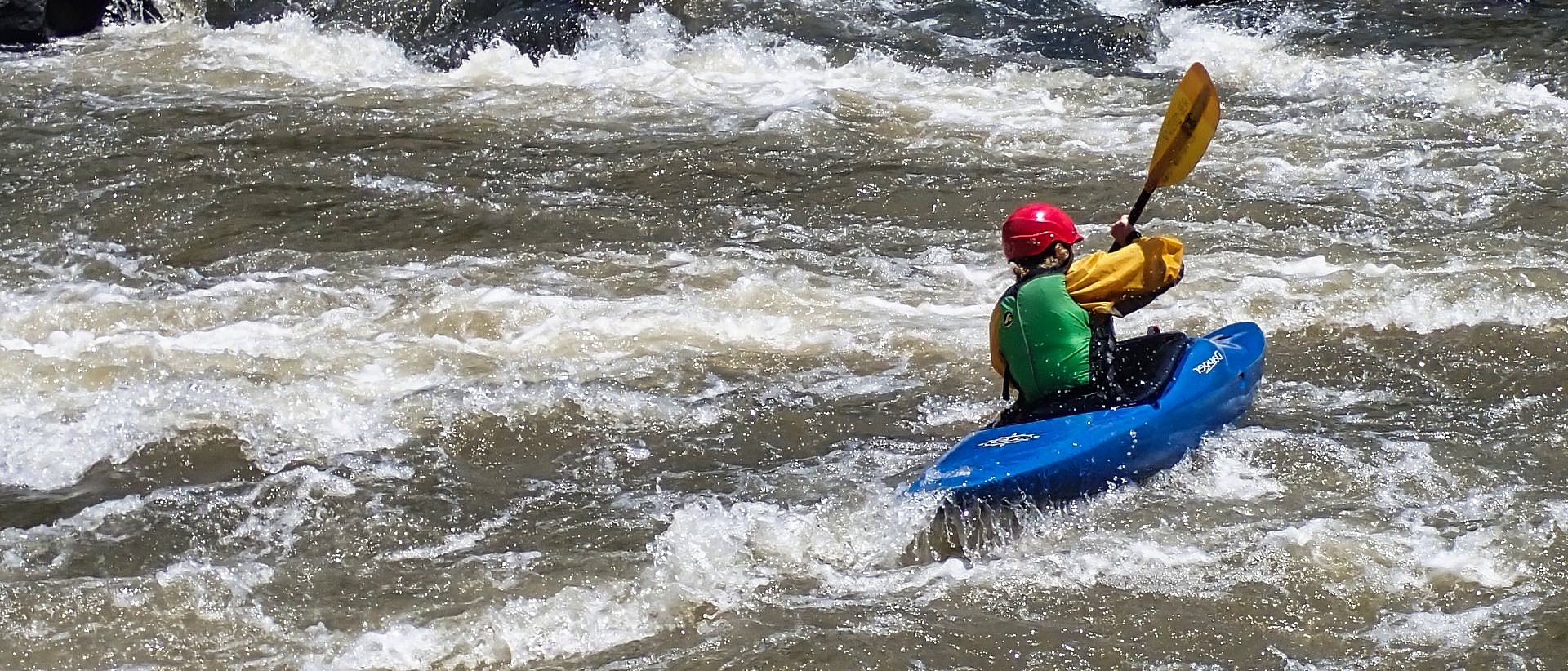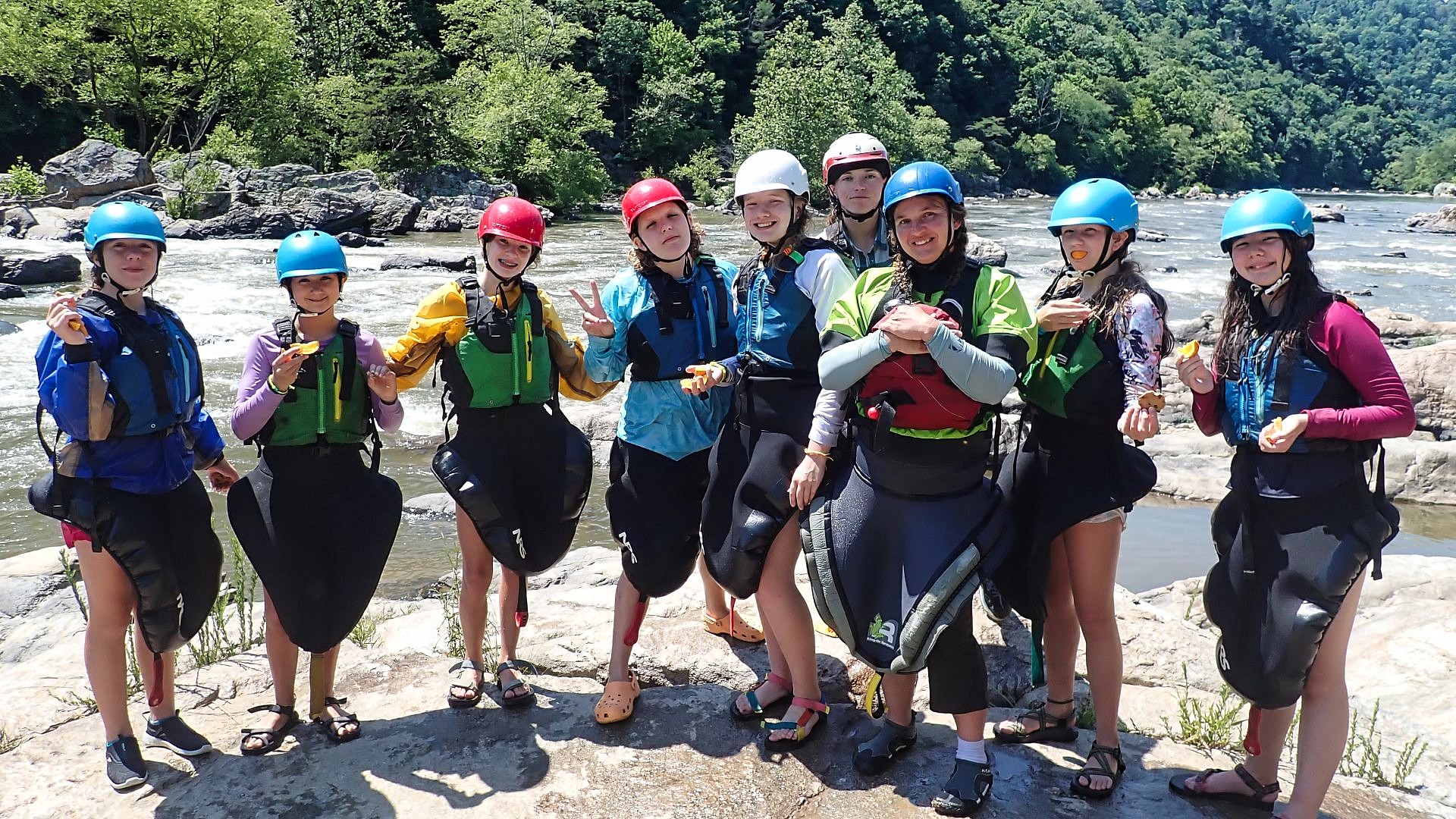Today, we have a special post written by Sonya Korabelnikova, one of our whitewater instructors. It’s a fascinating glimpse into what out-of-camp adventure trips are like, and what the girls learn in addition to having fun and improving their kayaking skills. Enjoy!
I knew we had a very big day ahead of us when I showed up at camp around 7:45am. Today we would be running section IX of the French Broad River, a whitewater kayaking trip that is a step more advanced. We always try to run the river and be back in time for dinner, and this trip is a long one, especially if we were hoping to squeeze in a stop at Dolly’s on the way back.
To my surprise the campers arrived ready, with all their gear, clothes, sunscreen, etc. It turns out Lula went to talk to everyone the night before to make sure they would be ready to go early. KK jumped on the trailer right away helping to tie the boats. She has perfected her truckers hitch, so while I still checked her knots, I really didn’t have to. She ties them very well. Everyone else helped too, loading the gear and boats into the van without me saying a word. By now they all know what to do and everyone finds the spot where they are the most helpful. We were able to leave camp by 9:06am, much earlier than I have expected. This was a pleasant surprise because last week it took more than twice that time.
Arriving at the river, everyone was ready and excited to go. Riley, the youngest camper (she is only 11 and this would be only her 4th time on a whitewater river) needed some extra help carrying her boat and putting her skirt on. Before I got a chance to help, Kate and Willa were already helping her. Again, with everyone pitching in, we were able to get on the river in no time.
We arrived at a large eddy and decided to practice t-rescues and rolls. As we were working, one of the girls said she was afraid. When I asked her about that, she explained she was “afraid to fail.” I’ve noticed this as a recurring conversation this year— worrying about failing. So, instead of working on rolls, we took a moment and talked about how important it was to try, even when there is a chance of failure. We talked about how not trying is often worse than not succeeding, and how failing is often a part of learning because no one ever succeeds in everything all the time, especially when first starting out. Back at our roll practice, some of them failed but tried again. Some succeeded, but everyone looked happy to keep trying.
Next up was Pillow Rock, the most difficult and largest rapid on the river. We got out of our boats and climbed up the rock to scout. Lula, KK and Willa were ready to move forward, seeing their line and having no fear. I smiled and told them to go. They climbed down the rock, got into their boats and charged one after another. Of course, they hit the perfect line.
Grape and Kate were nervous. They asked me if I thought they were ready for this rapid. I told them that I thought they were ready, but it was really up to them if they wanted to run it or not. They looked at each other, having a silent conversation. A few minutes later, there were cheers from everyone because they successfully ran the rapid!
Riley was the last one. She said to me, “I’m scared, but I really want to do it. Can I follow you?” “Sure,” I said, “we can go together.” We climbed down, she got in her boat and charged after me. After she took one confident stroke after another, I knew she would be fine. She made it to the bottom of the rapid and other girls offered her high fives and cheers.
At the Swimmers Rapid, we had the girls ferry over to practice their skills. When one of them flipped and swam, half of the other girls charged over to help get her to shore. Soon these other campers were reassuring the camper, retrieving her gear, and getting her back in her boat. I felt that I didn’t need to add anything, since these girls knew how to properly handle this situation, both the rescue part and emotional part as well.
We got to the take out and had a few minutes for more roll practice and swimming. As some of them practiced, others gave their friends tips. I was surprised again. They seemed to remember everything we taught them and some of them were really good at explaining it to their friends.
Back in the bus, the girls were fiddling with their bracelets. They get a knotted cord bracelet for going kayaking, and a different bead for every achievement like paddling a specific river, or accomplishing a maneuver. The bracelets are made by tying a fishermen knot. Kate, who perfected the knot, was teaching everyone how to do it. We discovered that Riley was missing the bracelet and she was leaving the next day. But with no time to make her one, Grape took her bracelet off and said, “Here, you can have mine. I want you to have a bracelet before you leave.”
The conversation on the bus began to get louder. This is the first time on the trip that I heard Riley join in talking. At first, she may have felt like an outsider being the youngest camper on the trip. But now, she is clearly part of the team. All of them are.
Also on the bus ride home, I asked them to list their achievements of the day. They answered, “I punched the hole. I rolled. I caught the small eddy. I ran a big rapid.” Funny enough, none of them mentioned what I think are their biggest achievements: I helped and supported a friend. I made sure everyone was included. I was brave. I was strong. I took initiative when no one asked. I was a team member. With all this, it’s easy to understand why I am so proud of them.
As we sat outside of the Dolly’s eating our ice cream, the girls talked about how much they enjoyed the day and how much they want to come back to go kayaking again. I hope they will. I hope they will have more opportunities to enjoy this sport that will challenge them, force them to be a team member, take them out into nature, and will help them grow into the strong independent women we all want them to be.







0 Comments
Comment section